Commercial and Corporations Law Assignment: Corporations Act Analysis
VerifiedAdded on 2022/11/17
|11
|2930
|109
Homework Assignment
AI Summary
This assignment on Commercial and Corporations Law delves into the duties and responsibilities of company directors, referencing the Corporations Act 2001 (Cth). Part 1 addresses general and fiduciary duties, insolvent trading under section 588G, and the safe harbor defense under section 588GA. It examines the restrictions of Section 588GA and the implications of voluntary insolvency. Part 2 presents a case study analyzing a director's breach of duties, including violations of sections 180, 181, 182, and 184. The assignment explores the liability of directors, the misappropriation of company funds, and the concept of insolvent trading. It highlights the importance of acting in good faith, exercising due diligence, and disclosing information to shareholders. The assignment provides a comprehensive overview of director's responsibilities and the relevant provisions of the Corporations Act, offering a detailed analysis of the legal obligations and potential consequences of non-compliance.
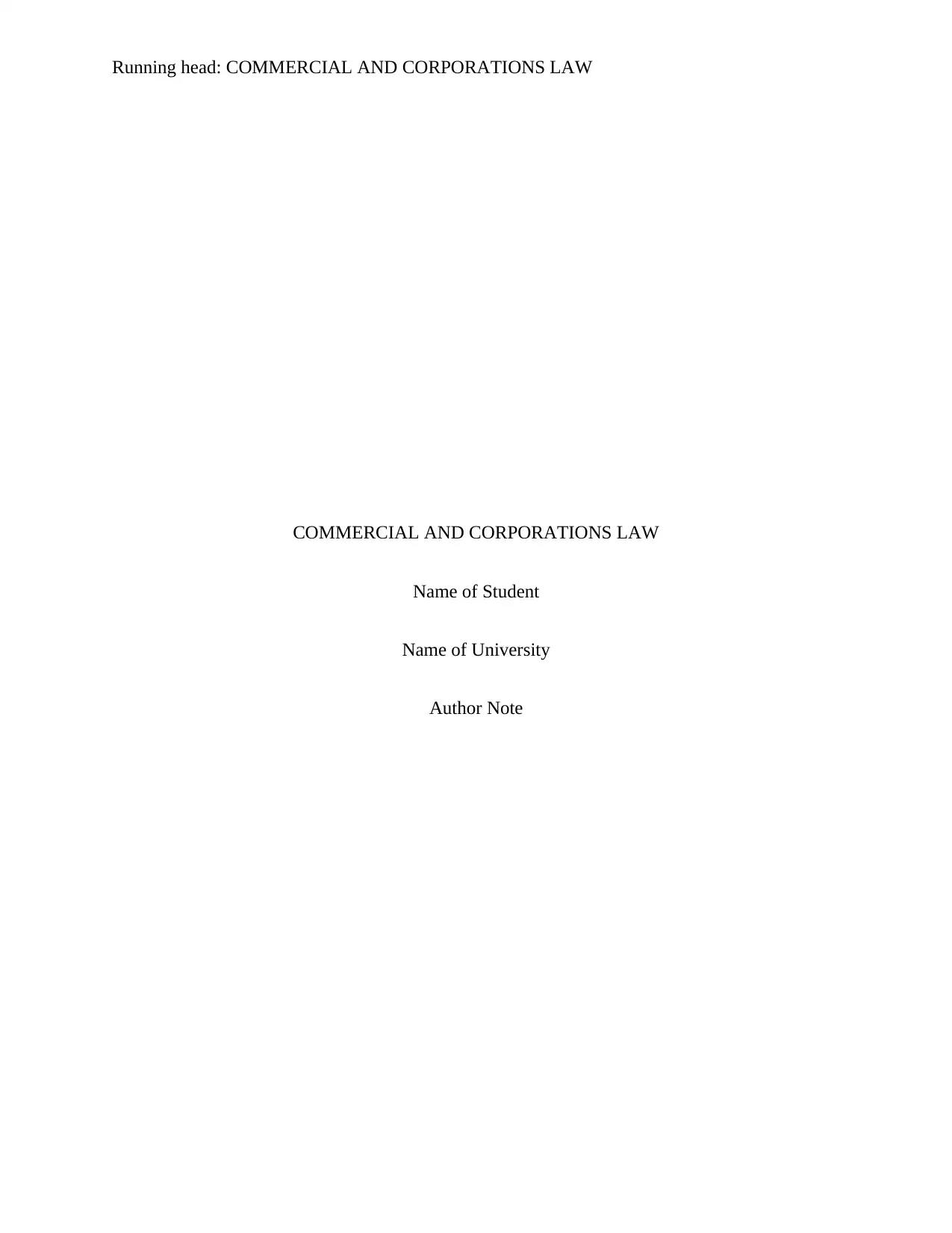
Running head: COMMERCIAL AND CORPORATIONS LAW
COMMERCIAL AND CORPORATIONS LAW
Name of Student
Name of University
Author Note
COMMERCIAL AND CORPORATIONS LAW
Name of Student
Name of University
Author Note
Paraphrase This Document
Need a fresh take? Get an instant paraphrase of this document with our AI Paraphraser
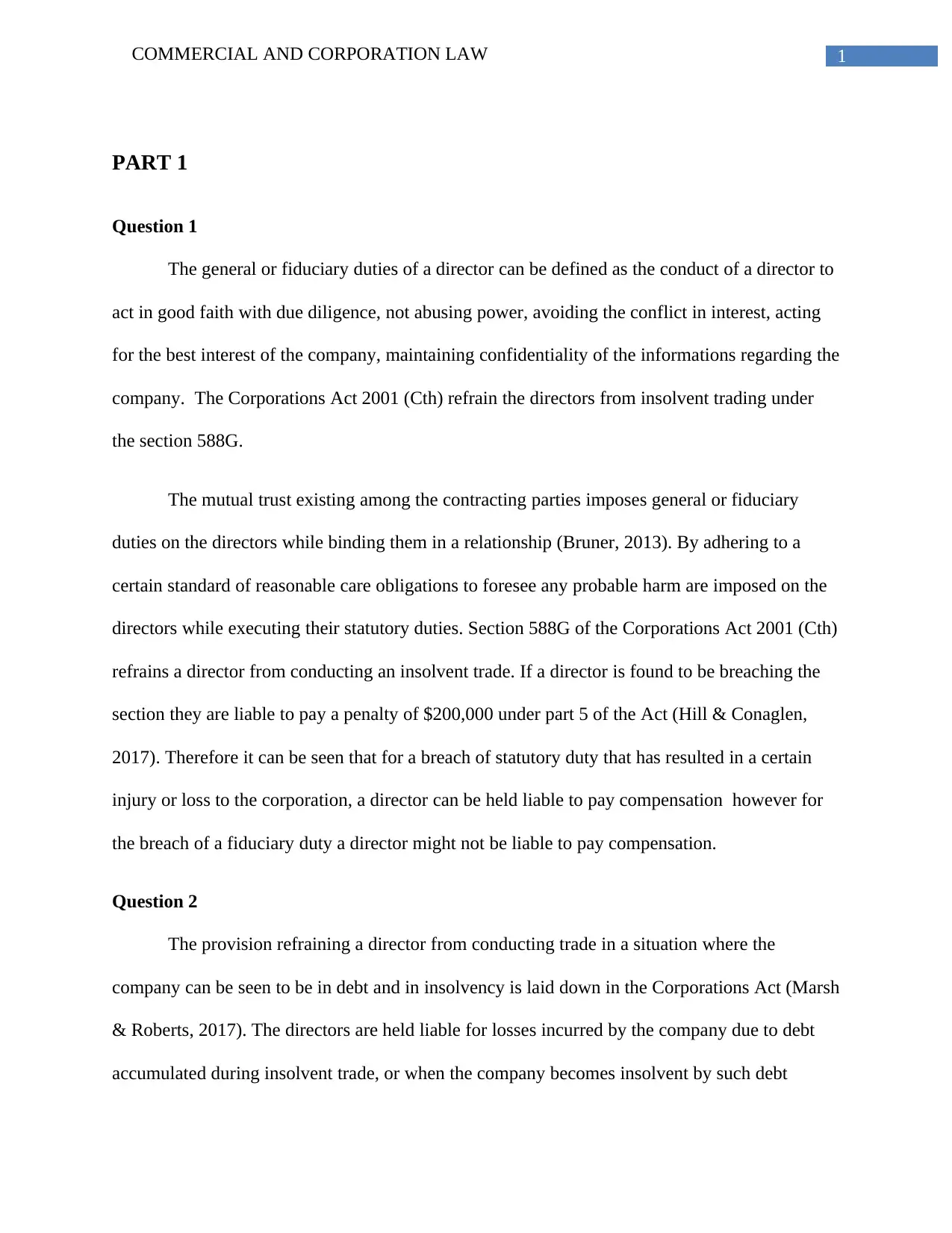
1COMMERCIAL AND CORPORATION LAW
PART 1
Question 1
The general or fiduciary duties of a director can be defined as the conduct of a director to
act in good faith with due diligence, not abusing power, avoiding the conflict in interest, acting
for the best interest of the company, maintaining confidentiality of the informations regarding the
company. The Corporations Act 2001 (Cth) refrain the directors from insolvent trading under
the section 588G.
The mutual trust existing among the contracting parties imposes general or fiduciary
duties on the directors while binding them in a relationship (Bruner, 2013). By adhering to a
certain standard of reasonable care obligations to foresee any probable harm are imposed on the
directors while executing their statutory duties. Section 588G of the Corporations Act 2001 (Cth)
refrains a director from conducting an insolvent trade. If a director is found to be breaching the
section they are liable to pay a penalty of $200,000 under part 5 of the Act (Hill & Conaglen,
2017). Therefore it can be seen that for a breach of statutory duty that has resulted in a certain
injury or loss to the corporation, a director can be held liable to pay compensation however for
the breach of a fiduciary duty a director might not be liable to pay compensation.
Question 2
The provision refraining a director from conducting trade in a situation where the
company can be seen to be in debt and in insolvency is laid down in the Corporations Act (Marsh
& Roberts, 2017). The directors are held liable for losses incurred by the company due to debt
accumulated during insolvent trade, or when the company becomes insolvent by such debt
PART 1
Question 1
The general or fiduciary duties of a director can be defined as the conduct of a director to
act in good faith with due diligence, not abusing power, avoiding the conflict in interest, acting
for the best interest of the company, maintaining confidentiality of the informations regarding the
company. The Corporations Act 2001 (Cth) refrain the directors from insolvent trading under
the section 588G.
The mutual trust existing among the contracting parties imposes general or fiduciary
duties on the directors while binding them in a relationship (Bruner, 2013). By adhering to a
certain standard of reasonable care obligations to foresee any probable harm are imposed on the
directors while executing their statutory duties. Section 588G of the Corporations Act 2001 (Cth)
refrains a director from conducting an insolvent trade. If a director is found to be breaching the
section they are liable to pay a penalty of $200,000 under part 5 of the Act (Hill & Conaglen,
2017). Therefore it can be seen that for a breach of statutory duty that has resulted in a certain
injury or loss to the corporation, a director can be held liable to pay compensation however for
the breach of a fiduciary duty a director might not be liable to pay compensation.
Question 2
The provision refraining a director from conducting trade in a situation where the
company can be seen to be in debt and in insolvency is laid down in the Corporations Act (Marsh
& Roberts, 2017). The directors are held liable for losses incurred by the company due to debt
accumulated during insolvent trade, or when the company becomes insolvent by such debt
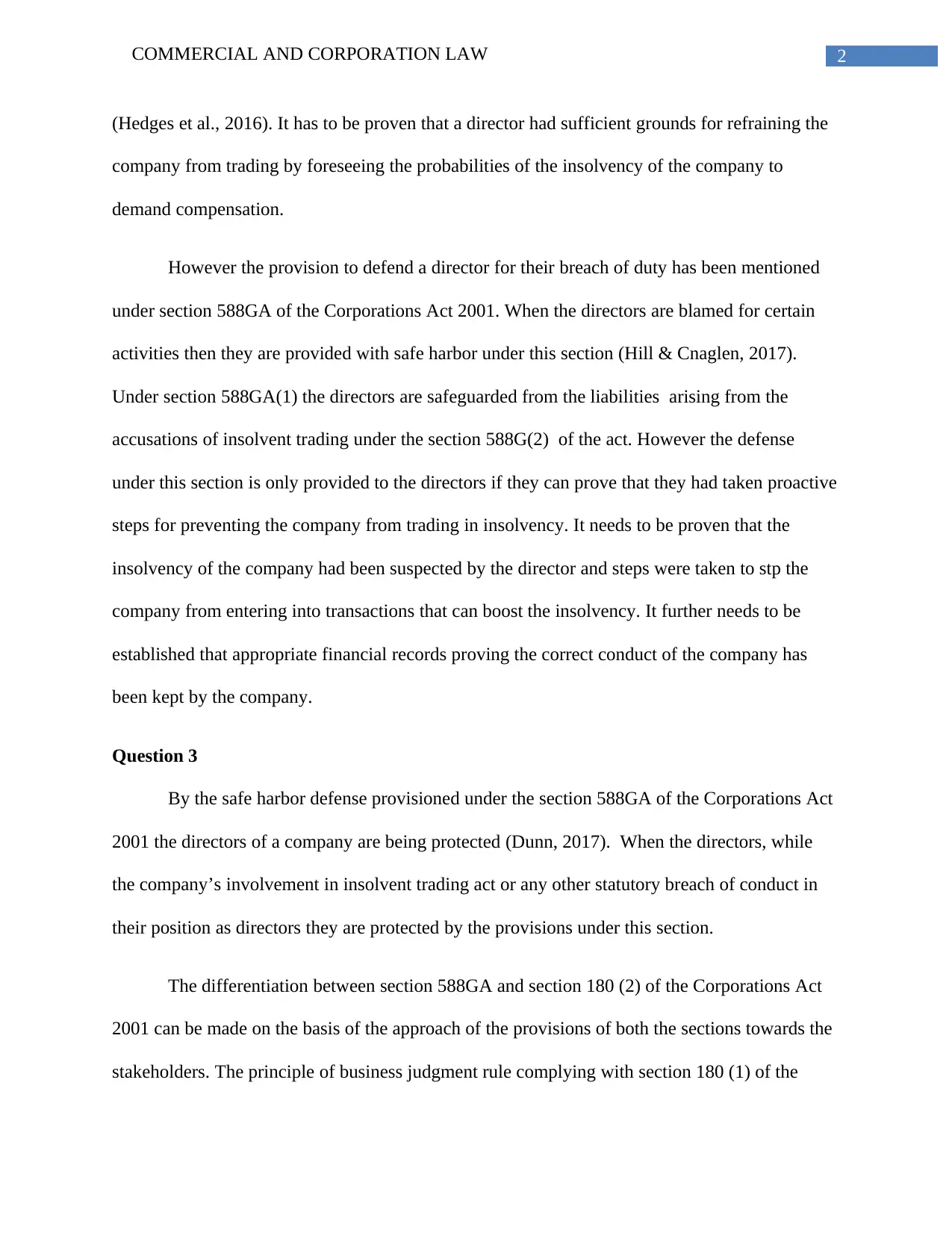
2COMMERCIAL AND CORPORATION LAW
(Hedges et al., 2016). It has to be proven that a director had sufficient grounds for refraining the
company from trading by foreseeing the probabilities of the insolvency of the company to
demand compensation.
However the provision to defend a director for their breach of duty has been mentioned
under section 588GA of the Corporations Act 2001. When the directors are blamed for certain
activities then they are provided with safe harbor under this section (Hill & Cnaglen, 2017).
Under section 588GA(1) the directors are safeguarded from the liabilities arising from the
accusations of insolvent trading under the section 588G(2) of the act. However the defense
under this section is only provided to the directors if they can prove that they had taken proactive
steps for preventing the company from trading in insolvency. It needs to be proven that the
insolvency of the company had been suspected by the director and steps were taken to stp the
company from entering into transactions that can boost the insolvency. It further needs to be
established that appropriate financial records proving the correct conduct of the company has
been kept by the company.
Question 3
By the safe harbor defense provisioned under the section 588GA of the Corporations Act
2001 the directors of a company are being protected (Dunn, 2017). When the directors, while
the company’s involvement in insolvent trading act or any other statutory breach of conduct in
their position as directors they are protected by the provisions under this section.
The differentiation between section 588GA and section 180 (2) of the Corporations Act
2001 can be made on the basis of the approach of the provisions of both the sections towards the
stakeholders. The principle of business judgment rule complying with section 180 (1) of the
(Hedges et al., 2016). It has to be proven that a director had sufficient grounds for refraining the
company from trading by foreseeing the probabilities of the insolvency of the company to
demand compensation.
However the provision to defend a director for their breach of duty has been mentioned
under section 588GA of the Corporations Act 2001. When the directors are blamed for certain
activities then they are provided with safe harbor under this section (Hill & Cnaglen, 2017).
Under section 588GA(1) the directors are safeguarded from the liabilities arising from the
accusations of insolvent trading under the section 588G(2) of the act. However the defense
under this section is only provided to the directors if they can prove that they had taken proactive
steps for preventing the company from trading in insolvency. It needs to be proven that the
insolvency of the company had been suspected by the director and steps were taken to stp the
company from entering into transactions that can boost the insolvency. It further needs to be
established that appropriate financial records proving the correct conduct of the company has
been kept by the company.
Question 3
By the safe harbor defense provisioned under the section 588GA of the Corporations Act
2001 the directors of a company are being protected (Dunn, 2017). When the directors, while
the company’s involvement in insolvent trading act or any other statutory breach of conduct in
their position as directors they are protected by the provisions under this section.
The differentiation between section 588GA and section 180 (2) of the Corporations Act
2001 can be made on the basis of the approach of the provisions of both the sections towards the
stakeholders. The principle of business judgment rule complying with section 180 (1) of the
⊘ This is a preview!⊘
Do you want full access?
Subscribe today to unlock all pages.

Trusted by 1+ million students worldwide
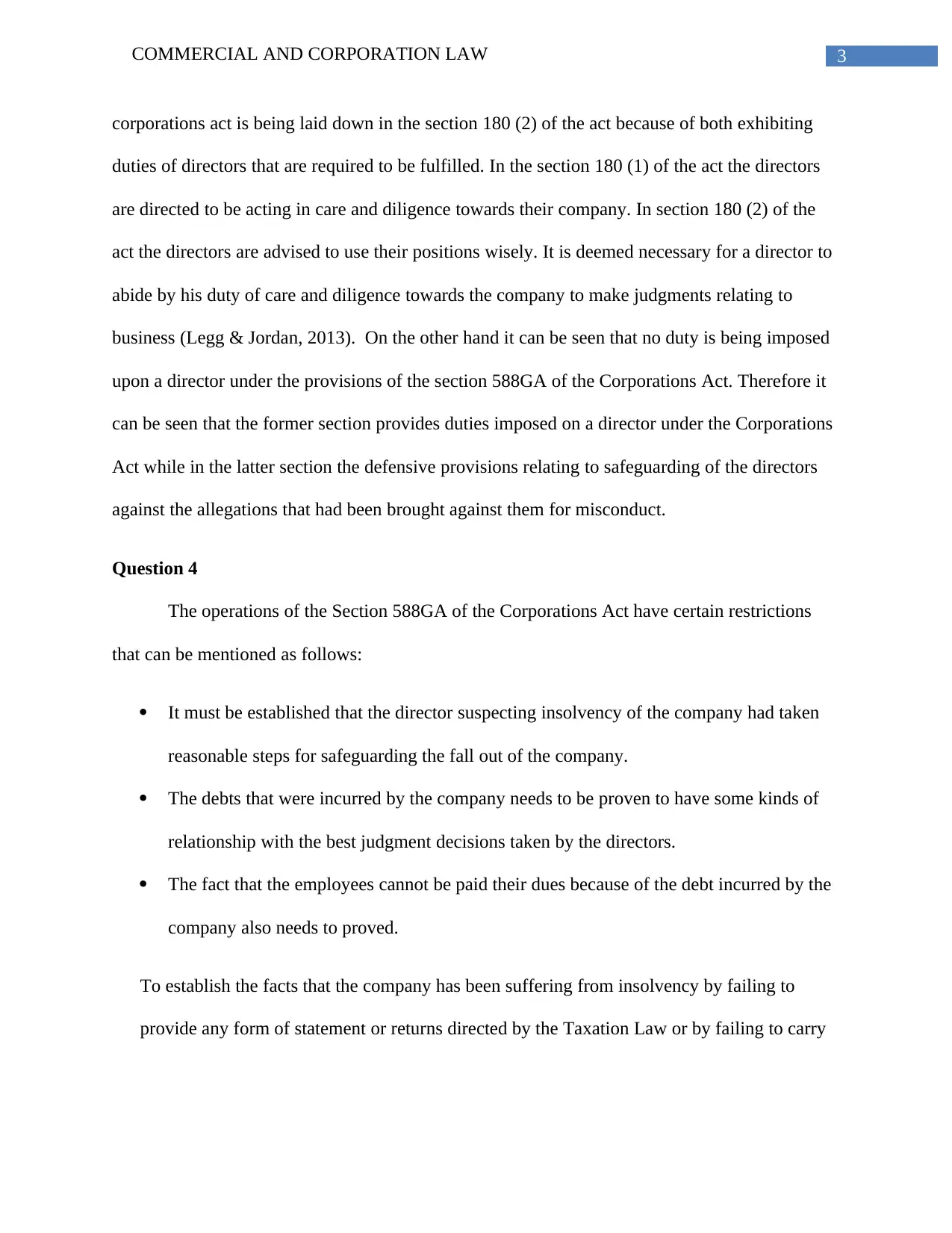
3COMMERCIAL AND CORPORATION LAW
corporations act is being laid down in the section 180 (2) of the act because of both exhibiting
duties of directors that are required to be fulfilled. In the section 180 (1) of the act the directors
are directed to be acting in care and diligence towards their company. In section 180 (2) of the
act the directors are advised to use their positions wisely. It is deemed necessary for a director to
abide by his duty of care and diligence towards the company to make judgments relating to
business (Legg & Jordan, 2013). On the other hand it can be seen that no duty is being imposed
upon a director under the provisions of the section 588GA of the Corporations Act. Therefore it
can be seen that the former section provides duties imposed on a director under the Corporations
Act while in the latter section the defensive provisions relating to safeguarding of the directors
against the allegations that had been brought against them for misconduct.
Question 4
The operations of the Section 588GA of the Corporations Act have certain restrictions
that can be mentioned as follows:
It must be established that the director suspecting insolvency of the company had taken
reasonable steps for safeguarding the fall out of the company.
The debts that were incurred by the company needs to be proven to have some kinds of
relationship with the best judgment decisions taken by the directors.
The fact that the employees cannot be paid their dues because of the debt incurred by the
company also needs to proved.
To establish the facts that the company has been suffering from insolvency by failing to
provide any form of statement or returns directed by the Taxation Law or by failing to carry
corporations act is being laid down in the section 180 (2) of the act because of both exhibiting
duties of directors that are required to be fulfilled. In the section 180 (1) of the act the directors
are directed to be acting in care and diligence towards their company. In section 180 (2) of the
act the directors are advised to use their positions wisely. It is deemed necessary for a director to
abide by his duty of care and diligence towards the company to make judgments relating to
business (Legg & Jordan, 2013). On the other hand it can be seen that no duty is being imposed
upon a director under the provisions of the section 588GA of the Corporations Act. Therefore it
can be seen that the former section provides duties imposed on a director under the Corporations
Act while in the latter section the defensive provisions relating to safeguarding of the directors
against the allegations that had been brought against them for misconduct.
Question 4
The operations of the Section 588GA of the Corporations Act have certain restrictions
that can be mentioned as follows:
It must be established that the director suspecting insolvency of the company had taken
reasonable steps for safeguarding the fall out of the company.
The debts that were incurred by the company needs to be proven to have some kinds of
relationship with the best judgment decisions taken by the directors.
The fact that the employees cannot be paid their dues because of the debt incurred by the
company also needs to proved.
To establish the facts that the company has been suffering from insolvency by failing to
provide any form of statement or returns directed by the Taxation Law or by failing to carry
Paraphrase This Document
Need a fresh take? Get an instant paraphrase of this document with our AI Paraphraser
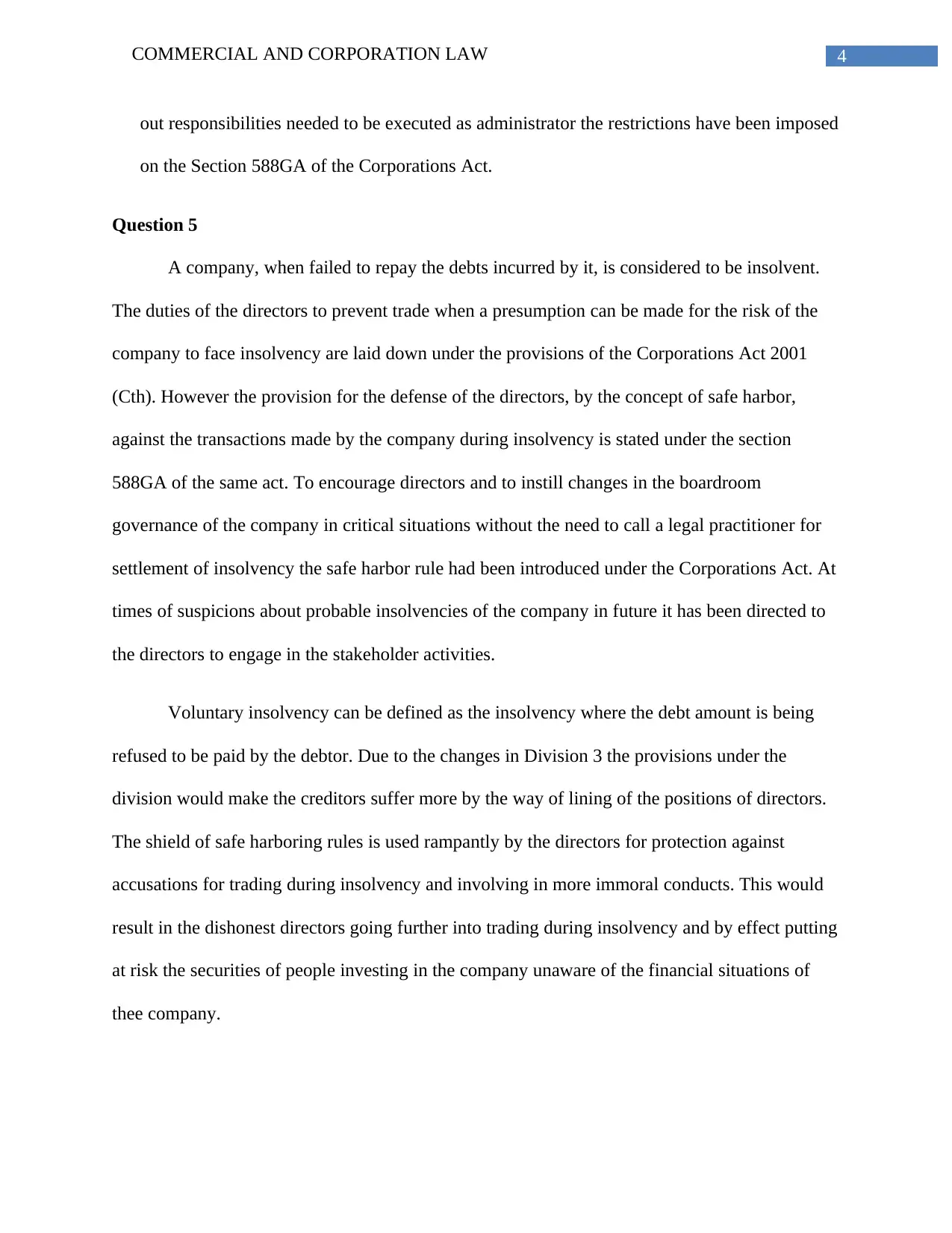
4COMMERCIAL AND CORPORATION LAW
out responsibilities needed to be executed as administrator the restrictions have been imposed
on the Section 588GA of the Corporations Act.
Question 5
A company, when failed to repay the debts incurred by it, is considered to be insolvent.
The duties of the directors to prevent trade when a presumption can be made for the risk of the
company to face insolvency are laid down under the provisions of the Corporations Act 2001
(Cth). However the provision for the defense of the directors, by the concept of safe harbor,
against the transactions made by the company during insolvency is stated under the section
588GA of the same act. To encourage directors and to instill changes in the boardroom
governance of the company in critical situations without the need to call a legal practitioner for
settlement of insolvency the safe harbor rule had been introduced under the Corporations Act. At
times of suspicions about probable insolvencies of the company in future it has been directed to
the directors to engage in the stakeholder activities.
Voluntary insolvency can be defined as the insolvency where the debt amount is being
refused to be paid by the debtor. Due to the changes in Division 3 the provisions under the
division would make the creditors suffer more by the way of lining of the positions of directors.
The shield of safe harboring rules is used rampantly by the directors for protection against
accusations for trading during insolvency and involving in more immoral conducts. This would
result in the dishonest directors going further into trading during insolvency and by effect putting
at risk the securities of people investing in the company unaware of the financial situations of
thee company.
out responsibilities needed to be executed as administrator the restrictions have been imposed
on the Section 588GA of the Corporations Act.
Question 5
A company, when failed to repay the debts incurred by it, is considered to be insolvent.
The duties of the directors to prevent trade when a presumption can be made for the risk of the
company to face insolvency are laid down under the provisions of the Corporations Act 2001
(Cth). However the provision for the defense of the directors, by the concept of safe harbor,
against the transactions made by the company during insolvency is stated under the section
588GA of the same act. To encourage directors and to instill changes in the boardroom
governance of the company in critical situations without the need to call a legal practitioner for
settlement of insolvency the safe harbor rule had been introduced under the Corporations Act. At
times of suspicions about probable insolvencies of the company in future it has been directed to
the directors to engage in the stakeholder activities.
Voluntary insolvency can be defined as the insolvency where the debt amount is being
refused to be paid by the debtor. Due to the changes in Division 3 the provisions under the
division would make the creditors suffer more by the way of lining of the positions of directors.
The shield of safe harboring rules is used rampantly by the directors for protection against
accusations for trading during insolvency and involving in more immoral conducts. This would
result in the dishonest directors going further into trading during insolvency and by effect putting
at risk the securities of people investing in the company unaware of the financial situations of
thee company.
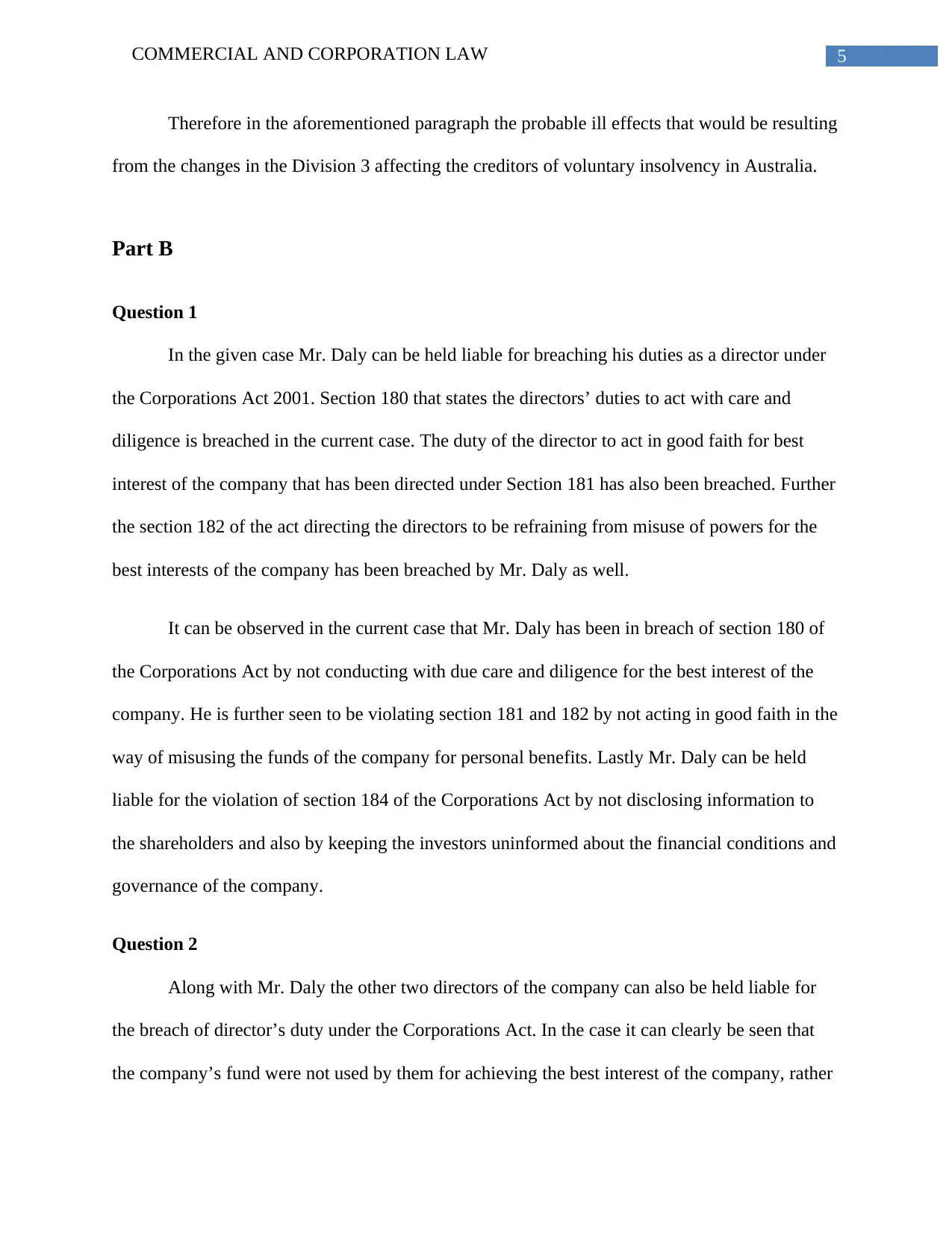
5COMMERCIAL AND CORPORATION LAW
Therefore in the aforementioned paragraph the probable ill effects that would be resulting
from the changes in the Division 3 affecting the creditors of voluntary insolvency in Australia.
Part B
Question 1
In the given case Mr. Daly can be held liable for breaching his duties as a director under
the Corporations Act 2001. Section 180 that states the directors’ duties to act with care and
diligence is breached in the current case. The duty of the director to act in good faith for best
interest of the company that has been directed under Section 181 has also been breached. Further
the section 182 of the act directing the directors to be refraining from misuse of powers for the
best interests of the company has been breached by Mr. Daly as well.
It can be observed in the current case that Mr. Daly has been in breach of section 180 of
the Corporations Act by not conducting with due care and diligence for the best interest of the
company. He is further seen to be violating section 181 and 182 by not acting in good faith in the
way of misusing the funds of the company for personal benefits. Lastly Mr. Daly can be held
liable for the violation of section 184 of the Corporations Act by not disclosing information to
the shareholders and also by keeping the investors uninformed about the financial conditions and
governance of the company.
Question 2
Along with Mr. Daly the other two directors of the company can also be held liable for
the breach of director’s duty under the Corporations Act. In the case it can clearly be seen that
the company’s fund were not used by them for achieving the best interest of the company, rather
Therefore in the aforementioned paragraph the probable ill effects that would be resulting
from the changes in the Division 3 affecting the creditors of voluntary insolvency in Australia.
Part B
Question 1
In the given case Mr. Daly can be held liable for breaching his duties as a director under
the Corporations Act 2001. Section 180 that states the directors’ duties to act with care and
diligence is breached in the current case. The duty of the director to act in good faith for best
interest of the company that has been directed under Section 181 has also been breached. Further
the section 182 of the act directing the directors to be refraining from misuse of powers for the
best interests of the company has been breached by Mr. Daly as well.
It can be observed in the current case that Mr. Daly has been in breach of section 180 of
the Corporations Act by not conducting with due care and diligence for the best interest of the
company. He is further seen to be violating section 181 and 182 by not acting in good faith in the
way of misusing the funds of the company for personal benefits. Lastly Mr. Daly can be held
liable for the violation of section 184 of the Corporations Act by not disclosing information to
the shareholders and also by keeping the investors uninformed about the financial conditions and
governance of the company.
Question 2
Along with Mr. Daly the other two directors of the company can also be held liable for
the breach of director’s duty under the Corporations Act. In the case it can clearly be seen that
the company’s fund were not used by them for achieving the best interest of the company, rather
⊘ This is a preview!⊘
Do you want full access?
Subscribe today to unlock all pages.

Trusted by 1+ million students worldwide
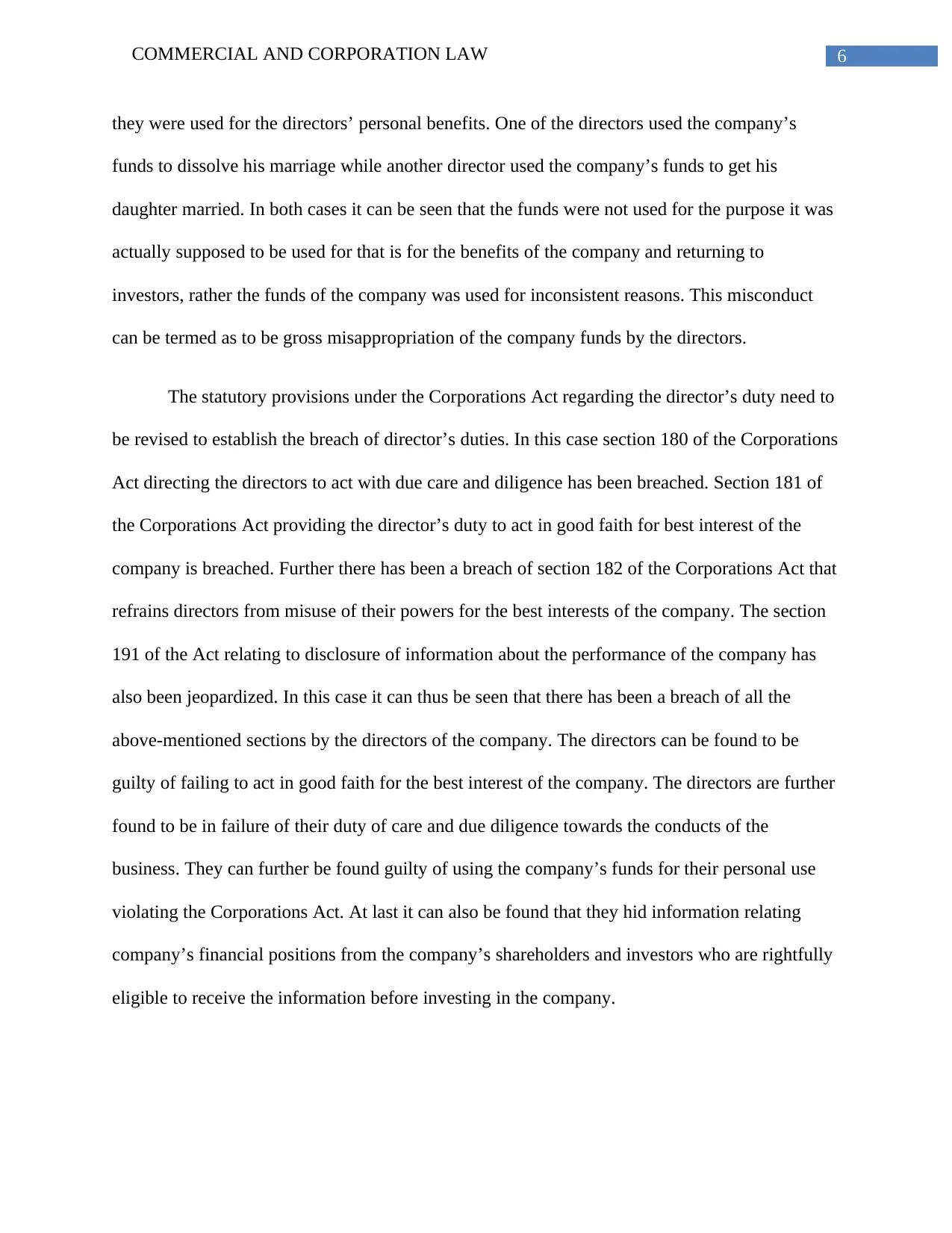
6COMMERCIAL AND CORPORATION LAW
they were used for the directors’ personal benefits. One of the directors used the company’s
funds to dissolve his marriage while another director used the company’s funds to get his
daughter married. In both cases it can be seen that the funds were not used for the purpose it was
actually supposed to be used for that is for the benefits of the company and returning to
investors, rather the funds of the company was used for inconsistent reasons. This misconduct
can be termed as to be gross misappropriation of the company funds by the directors.
The statutory provisions under the Corporations Act regarding the director’s duty need to
be revised to establish the breach of director’s duties. In this case section 180 of the Corporations
Act directing the directors to act with due care and diligence has been breached. Section 181 of
the Corporations Act providing the director’s duty to act in good faith for best interest of the
company is breached. Further there has been a breach of section 182 of the Corporations Act that
refrains directors from misuse of their powers for the best interests of the company. The section
191 of the Act relating to disclosure of information about the performance of the company has
also been jeopardized. In this case it can thus be seen that there has been a breach of all the
above-mentioned sections by the directors of the company. The directors can be found to be
guilty of failing to act in good faith for the best interest of the company. The directors are further
found to be in failure of their duty of care and due diligence towards the conducts of the
business. They can further be found guilty of using the company’s funds for their personal use
violating the Corporations Act. At last it can also be found that they hid information relating
company’s financial positions from the company’s shareholders and investors who are rightfully
eligible to receive the information before investing in the company.
they were used for the directors’ personal benefits. One of the directors used the company’s
funds to dissolve his marriage while another director used the company’s funds to get his
daughter married. In both cases it can be seen that the funds were not used for the purpose it was
actually supposed to be used for that is for the benefits of the company and returning to
investors, rather the funds of the company was used for inconsistent reasons. This misconduct
can be termed as to be gross misappropriation of the company funds by the directors.
The statutory provisions under the Corporations Act regarding the director’s duty need to
be revised to establish the breach of director’s duties. In this case section 180 of the Corporations
Act directing the directors to act with due care and diligence has been breached. Section 181 of
the Corporations Act providing the director’s duty to act in good faith for best interest of the
company is breached. Further there has been a breach of section 182 of the Corporations Act that
refrains directors from misuse of their powers for the best interests of the company. The section
191 of the Act relating to disclosure of information about the performance of the company has
also been jeopardized. In this case it can thus be seen that there has been a breach of all the
above-mentioned sections by the directors of the company. The directors can be found to be
guilty of failing to act in good faith for the best interest of the company. The directors are further
found to be in failure of their duty of care and due diligence towards the conducts of the
business. They can further be found guilty of using the company’s funds for their personal use
violating the Corporations Act. At last it can also be found that they hid information relating
company’s financial positions from the company’s shareholders and investors who are rightfully
eligible to receive the information before investing in the company.
Paraphrase This Document
Need a fresh take? Get an instant paraphrase of this document with our AI Paraphraser
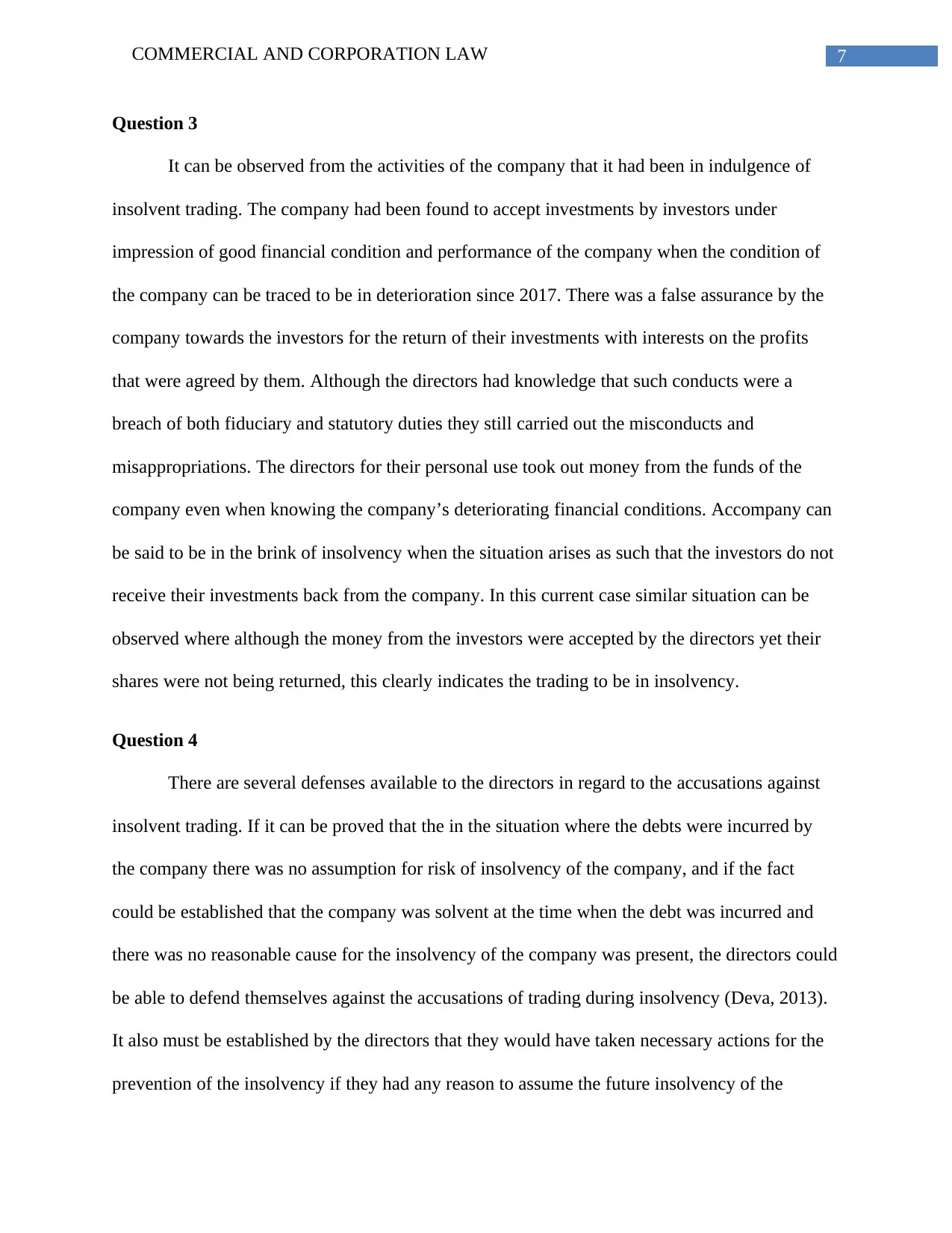
7COMMERCIAL AND CORPORATION LAW
Question 3
It can be observed from the activities of the company that it had been in indulgence of
insolvent trading. The company had been found to accept investments by investors under
impression of good financial condition and performance of the company when the condition of
the company can be traced to be in deterioration since 2017. There was a false assurance by the
company towards the investors for the return of their investments with interests on the profits
that were agreed by them. Although the directors had knowledge that such conducts were a
breach of both fiduciary and statutory duties they still carried out the misconducts and
misappropriations. The directors for their personal use took out money from the funds of the
company even when knowing the company’s deteriorating financial conditions. Accompany can
be said to be in the brink of insolvency when the situation arises as such that the investors do not
receive their investments back from the company. In this current case similar situation can be
observed where although the money from the investors were accepted by the directors yet their
shares were not being returned, this clearly indicates the trading to be in insolvency.
Question 4
There are several defenses available to the directors in regard to the accusations against
insolvent trading. If it can be proved that the in the situation where the debts were incurred by
the company there was no assumption for risk of insolvency of the company, and if the fact
could be established that the company was solvent at the time when the debt was incurred and
there was no reasonable cause for the insolvency of the company was present, the directors could
be able to defend themselves against the accusations of trading during insolvency (Deva, 2013).
It also must be established by the directors that they would have taken necessary actions for the
prevention of the insolvency if they had any reason to assume the future insolvency of the
Question 3
It can be observed from the activities of the company that it had been in indulgence of
insolvent trading. The company had been found to accept investments by investors under
impression of good financial condition and performance of the company when the condition of
the company can be traced to be in deterioration since 2017. There was a false assurance by the
company towards the investors for the return of their investments with interests on the profits
that were agreed by them. Although the directors had knowledge that such conducts were a
breach of both fiduciary and statutory duties they still carried out the misconducts and
misappropriations. The directors for their personal use took out money from the funds of the
company even when knowing the company’s deteriorating financial conditions. Accompany can
be said to be in the brink of insolvency when the situation arises as such that the investors do not
receive their investments back from the company. In this current case similar situation can be
observed where although the money from the investors were accepted by the directors yet their
shares were not being returned, this clearly indicates the trading to be in insolvency.
Question 4
There are several defenses available to the directors in regard to the accusations against
insolvent trading. If it can be proved that the in the situation where the debts were incurred by
the company there was no assumption for risk of insolvency of the company, and if the fact
could be established that the company was solvent at the time when the debt was incurred and
there was no reasonable cause for the insolvency of the company was present, the directors could
be able to defend themselves against the accusations of trading during insolvency (Deva, 2013).
It also must be established by the directors that they would have taken necessary actions for the
prevention of the insolvency if they had any reason to assume the future insolvency of the
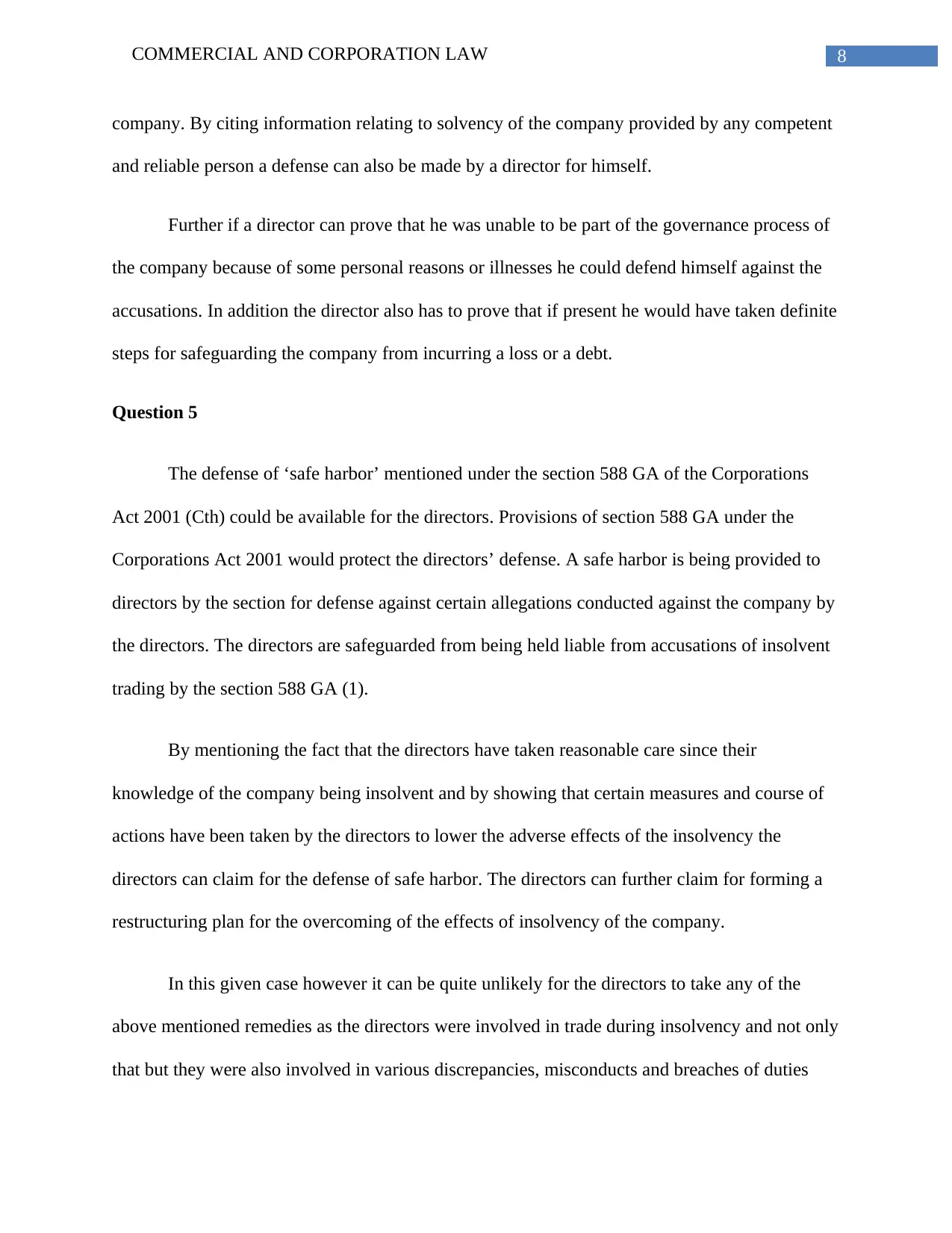
8COMMERCIAL AND CORPORATION LAW
company. By citing information relating to solvency of the company provided by any competent
and reliable person a defense can also be made by a director for himself.
Further if a director can prove that he was unable to be part of the governance process of
the company because of some personal reasons or illnesses he could defend himself against the
accusations. In addition the director also has to prove that if present he would have taken definite
steps for safeguarding the company from incurring a loss or a debt.
Question 5
The defense of ‘safe harbor’ mentioned under the section 588 GA of the Corporations
Act 2001 (Cth) could be available for the directors. Provisions of section 588 GA under the
Corporations Act 2001 would protect the directors’ defense. A safe harbor is being provided to
directors by the section for defense against certain allegations conducted against the company by
the directors. The directors are safeguarded from being held liable from accusations of insolvent
trading by the section 588 GA (1).
By mentioning the fact that the directors have taken reasonable care since their
knowledge of the company being insolvent and by showing that certain measures and course of
actions have been taken by the directors to lower the adverse effects of the insolvency the
directors can claim for the defense of safe harbor. The directors can further claim for forming a
restructuring plan for the overcoming of the effects of insolvency of the company.
In this given case however it can be quite unlikely for the directors to take any of the
above mentioned remedies as the directors were involved in trade during insolvency and not only
that but they were also involved in various discrepancies, misconducts and breaches of duties
company. By citing information relating to solvency of the company provided by any competent
and reliable person a defense can also be made by a director for himself.
Further if a director can prove that he was unable to be part of the governance process of
the company because of some personal reasons or illnesses he could defend himself against the
accusations. In addition the director also has to prove that if present he would have taken definite
steps for safeguarding the company from incurring a loss or a debt.
Question 5
The defense of ‘safe harbor’ mentioned under the section 588 GA of the Corporations
Act 2001 (Cth) could be available for the directors. Provisions of section 588 GA under the
Corporations Act 2001 would protect the directors’ defense. A safe harbor is being provided to
directors by the section for defense against certain allegations conducted against the company by
the directors. The directors are safeguarded from being held liable from accusations of insolvent
trading by the section 588 GA (1).
By mentioning the fact that the directors have taken reasonable care since their
knowledge of the company being insolvent and by showing that certain measures and course of
actions have been taken by the directors to lower the adverse effects of the insolvency the
directors can claim for the defense of safe harbor. The directors can further claim for forming a
restructuring plan for the overcoming of the effects of insolvency of the company.
In this given case however it can be quite unlikely for the directors to take any of the
above mentioned remedies as the directors were involved in trade during insolvency and not only
that but they were also involved in various discrepancies, misconducts and breaches of duties
⊘ This is a preview!⊘
Do you want full access?
Subscribe today to unlock all pages.

Trusted by 1+ million students worldwide
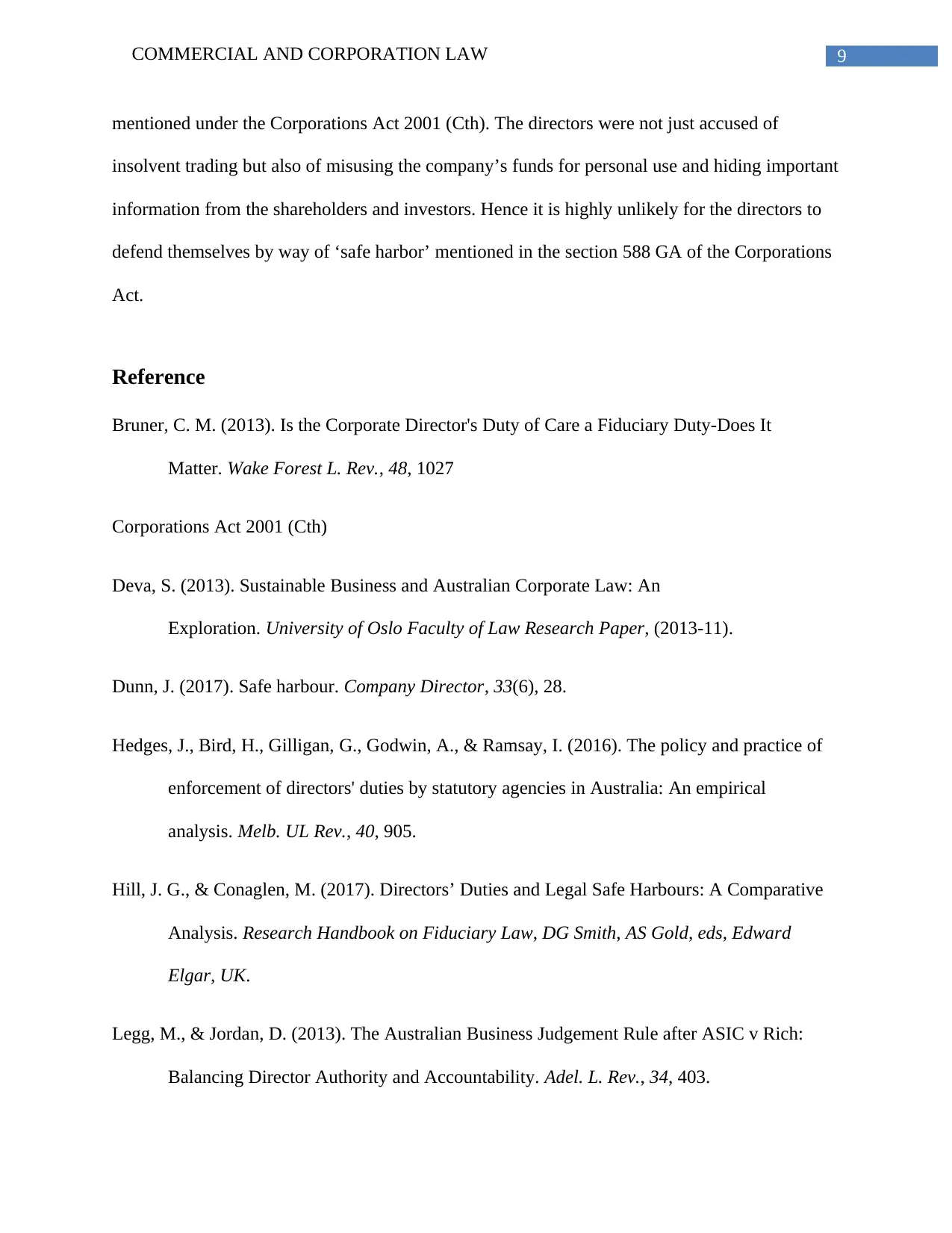
9COMMERCIAL AND CORPORATION LAW
mentioned under the Corporations Act 2001 (Cth). The directors were not just accused of
insolvent trading but also of misusing the company’s funds for personal use and hiding important
information from the shareholders and investors. Hence it is highly unlikely for the directors to
defend themselves by way of ‘safe harbor’ mentioned in the section 588 GA of the Corporations
Act.
Reference
Bruner, C. M. (2013). Is the Corporate Director's Duty of Care a Fiduciary Duty-Does It
Matter. Wake Forest L. Rev., 48, 1027
Corporations Act 2001 (Cth)
Deva, S. (2013). Sustainable Business and Australian Corporate Law: An
Exploration. University of Oslo Faculty of Law Research Paper, (2013-11).
Dunn, J. (2017). Safe harbour. Company Director, 33(6), 28.
Hedges, J., Bird, H., Gilligan, G., Godwin, A., & Ramsay, I. (2016). The policy and practice of
enforcement of directors' duties by statutory agencies in Australia: An empirical
analysis. Melb. UL Rev., 40, 905.
Hill, J. G., & Conaglen, M. (2017). Directors’ Duties and Legal Safe Harbours: A Comparative
Analysis. Research Handbook on Fiduciary Law, DG Smith, AS Gold, eds, Edward
Elgar, UK.
Legg, M., & Jordan, D. (2013). The Australian Business Judgement Rule after ASIC v Rich:
Balancing Director Authority and Accountability. Adel. L. Rev., 34, 403.
mentioned under the Corporations Act 2001 (Cth). The directors were not just accused of
insolvent trading but also of misusing the company’s funds for personal use and hiding important
information from the shareholders and investors. Hence it is highly unlikely for the directors to
defend themselves by way of ‘safe harbor’ mentioned in the section 588 GA of the Corporations
Act.
Reference
Bruner, C. M. (2013). Is the Corporate Director's Duty of Care a Fiduciary Duty-Does It
Matter. Wake Forest L. Rev., 48, 1027
Corporations Act 2001 (Cth)
Deva, S. (2013). Sustainable Business and Australian Corporate Law: An
Exploration. University of Oslo Faculty of Law Research Paper, (2013-11).
Dunn, J. (2017). Safe harbour. Company Director, 33(6), 28.
Hedges, J., Bird, H., Gilligan, G., Godwin, A., & Ramsay, I. (2016). The policy and practice of
enforcement of directors' duties by statutory agencies in Australia: An empirical
analysis. Melb. UL Rev., 40, 905.
Hill, J. G., & Conaglen, M. (2017). Directors’ Duties and Legal Safe Harbours: A Comparative
Analysis. Research Handbook on Fiduciary Law, DG Smith, AS Gold, eds, Edward
Elgar, UK.
Legg, M., & Jordan, D. (2013). The Australian Business Judgement Rule after ASIC v Rich:
Balancing Director Authority and Accountability. Adel. L. Rev., 34, 403.
Paraphrase This Document
Need a fresh take? Get an instant paraphrase of this document with our AI Paraphraser
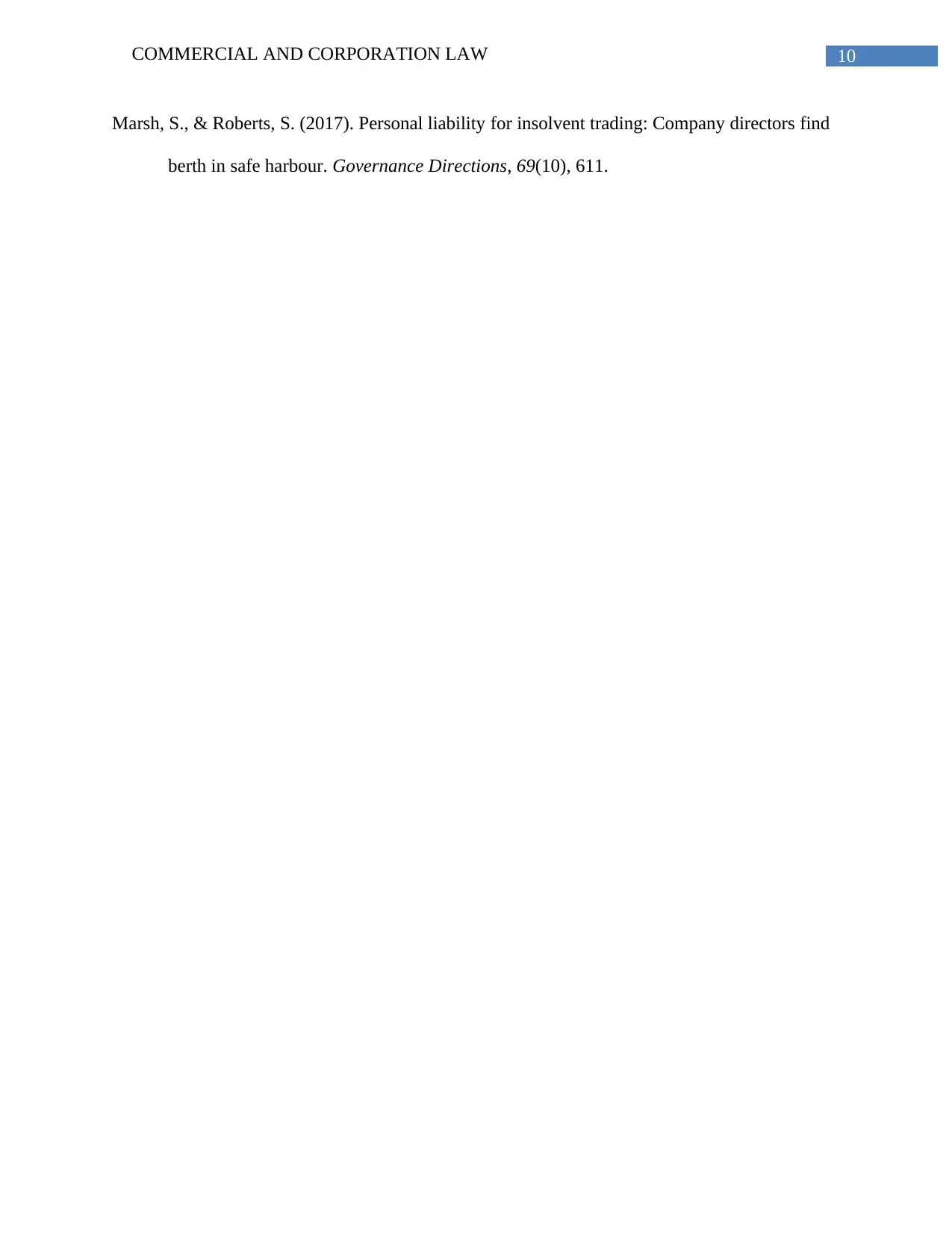
10COMMERCIAL AND CORPORATION LAW
Marsh, S., & Roberts, S. (2017). Personal liability for insolvent trading: Company directors find
berth in safe harbour. Governance Directions, 69(10), 611.
Marsh, S., & Roberts, S. (2017). Personal liability for insolvent trading: Company directors find
berth in safe harbour. Governance Directions, 69(10), 611.
1 out of 11
Related Documents
Your All-in-One AI-Powered Toolkit for Academic Success.
+13062052269
info@desklib.com
Available 24*7 on WhatsApp / Email
![[object Object]](/_next/static/media/star-bottom.7253800d.svg)
Unlock your academic potential
Copyright © 2020–2026 A2Z Services. All Rights Reserved. Developed and managed by ZUCOL.





